If you or your spouse plan to divorce in West Virginia, you need to be aware of the laws that govern this process and the types of divorce you can file for. In general, the cost and the timeframe of your divorce will depend on whether it is a contested or uncontested process and if the filing grounds are based on fault or no fault. There are different legal processes that will apply to each. Moreover, if you have children or property that must be divided, you can also expect a longer and overall more complicated process.
Table of Contents
ToggleIs West Virginia a No-Fault State?
West Virginia is a no-fault state, meaning that it allows spouses to end their marriage without putting the blame for it on any of the parties. However, couples can still file for a contested or uncontested divorce in West Virginia on the basis of both no-fault and fault grounds.
Filing based on fault grounds would mean that one of the parties would be more likely to get certain benefits in a divorce, and proving fault would likely prolong the court process. Even if you wish to file based on fault grounds, you may still talk to your spouse and try to agree on custody, property division, and other matters in order to make your marriage dissolution easier and quicker.
If you cannot reach an agreement in any type of divorce, you will most certainly go through a much longer and more stressful legal process.
The Grounds for Divorce in West Virginia
There are only two no-fault grounds for divorce in WV, which include irreconcilable differences and voluntary separation. The seven fault-based grounds are cruelty or inhuman treatment, conviction of a crime, adultery, incurable insanity, alcohol or drug addiction, desertion, and child abuse or neglect.
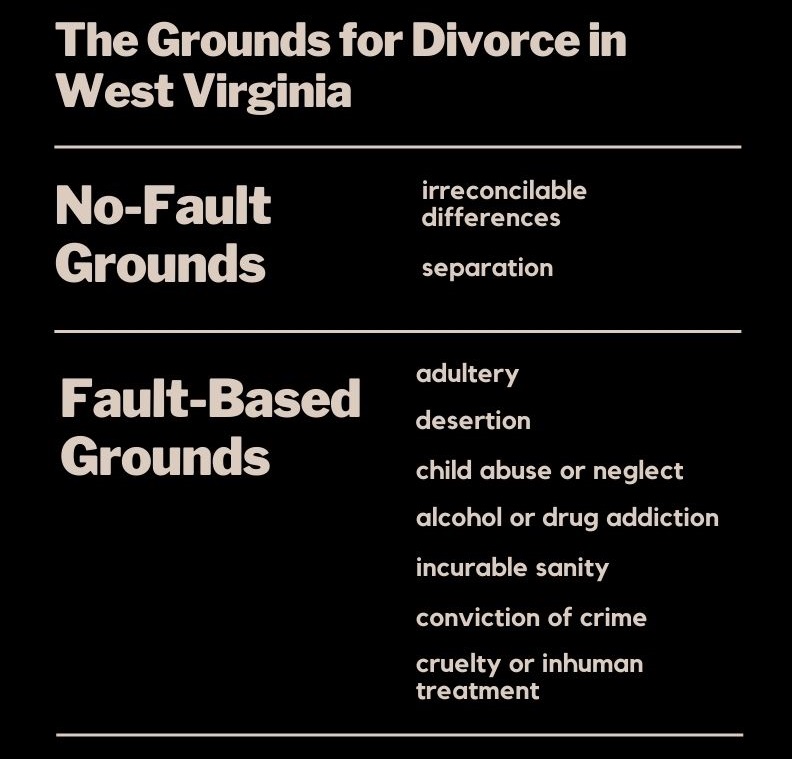
No-Fault Grounds
There are two no-fault grounds for marriage dissolution in WV – irreconcilable differences and separation. “Irreconcilable differences” imply that your marriage is irretrievably broken and there is a conflict or issue that will not allow you to get back together.
In order to file for a no-fault divorce on the basis of separation, you must reside separately for at least 1 year prior to filing. During this time, you should not have any relationships or intentions to repair your marriage.
Fault-Based Grounds
In West Virginia, there are the following fault grounds for divorce:
- Cruelty or inhuman treatment. If you become a victim of domestic abuse, you can file for a fault-based dissolution claiming cruel or inhuman treatment. According to state laws, cruel treatment includes physical harm, psychological abuse, unsubstantiated allegations of infidelity or homosexuality, and overall inhuman treatment that makes the life of the affected party insufferable. In WV, a petitioner does not need to provide evidence of physical abuse.
- Conviction of crime. If your spouse committed a felony crime during your marriage and was officially convicted, you can file for a divorce claiming this ground. It doesn’t matter where the crime was committed – the main thing that matters is when. If you married your spouse when they were already convicted, you cannot file based on this fault ground.
- Adultery. Adultery, which is voluntary sexual relations of one spouse with others out of wedlock, is also considered a divorce ground. However, in order to claim this ground, the filing spouse must provide substantial evidence, such as text messages with an affair partner, photo or video material, bills proving the cheating party was spending money on the other person, etc.
- Incurable sanity. If medical professionals find one of the spouses to be permanently and incurably insane, the second party can obtain a divorce based on this ground. It is also crucial that the spouse has been staying in a mental institution of any kind for 3 years in a row before the divorce was filed. Moreover, the judge will need to hear a competent expert in the medical sphere who can confirm that the mental illness is incurable. The judge may also decide to order the petitioner to pay the alimony to the ill spouse.
- Alcohol or drug addiction. A divorce in WV can also be filed on the basis of the habitual drunkenness of one of the spouses. It means that the cases of alcohol abuse should be regular, not occasional. Moreover, if one of the spouses has become a drug addict after the marriage, it can also become a ground for divorce. However, it should be proven that the spouse did not have this problem before the couple got married.
- Desertion. According to the West Virginia divorce laws, if one of the spouses was abandoned by the second party for more than 6 months, they can file for a marriage dissolution based on desertion. The spouse who had left the family home should not come back during this period for this ground to be accepted. They should also have no intention to return, so it would not work with cases where the spouse is deployed or on a contractual work trip.
- Child abuse or neglect. A divorce can be granted if one of the spouses has been abusive towards their child. Abuse, in this case, presupposes physical and mental violence inflicted on a child, including molestation. A petitioner can also obtain a divorce on the basis of this ground if there was consistent child neglect. It means that the second party ignored the needs of the child, and their indifference put the kid’s life in danger. The parent filing for a divorce must provide evidence of child abuse and neglect to the judge sufficient enough to make a decision on child custody in favor of the petitioner.
Residency Requirements for Filing for Divorce in West Virginia
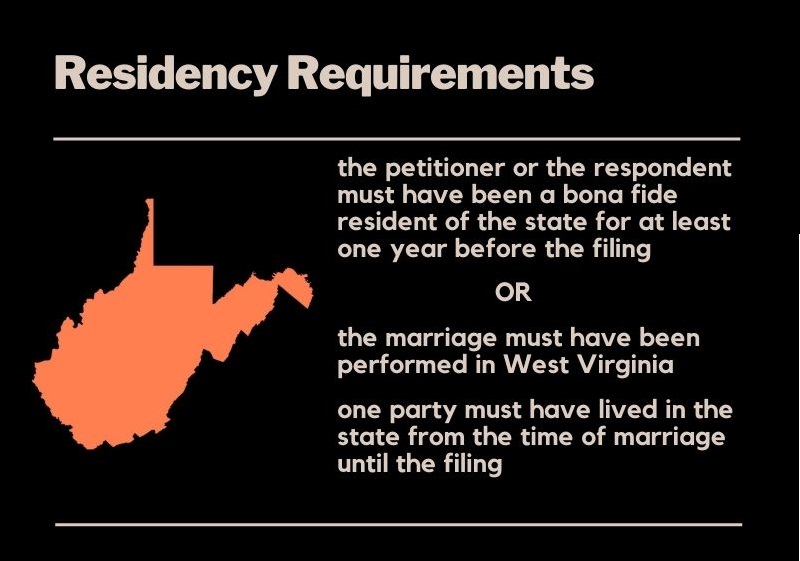
Before you file for divorce in WV, you must make sure that you comply with the residency requirements adopted in the state. It is needed for a court to be able to make crucial decisions in your case. In West Virginia, you or your spouse must have lived in the state for at least a year before filing.
Alternatively, in order to start a marriage dissolution process in WV, both you and your spouse must currently reside in the state, and your marriage must have been conducted in West Virginia.
Does WV Require Separation Before Divorce?
You should be separated for a year only if you file for divorce on the grounds of a one-year separation. Otherwise, there is no separation requirement. Separation, in this case, means living in different households. Whatever the grounds are, you will still need to indicate the date of your separation and the time you last lived together with your spouse in your divorce petition. The amount of time you were separated may affect certain decisions in your case, like determining what the marital property is or who should have custody.
How to File for Divorce in West Virginia?
If you work with a lawyer, they will guide you through this process. However, if you decide to file for divorce on your own, you need to be aware of the steps you are legally required to take to end your marriage. In general, you will need to do the following to obtain an uncontested marriage dissolution:
- Prepare your divorce paperwork.
- File the forms with the court.
- Serve the papers to your spouse.
- Find out the date of the final hearing from the court clerk.
- Attend the hearing, where the judge will finalize your divorce.
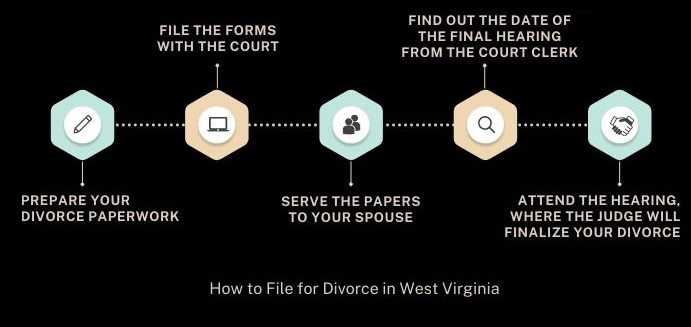
What Is the First Step in Divorce in WV?
The first step you should take in order to get divorced is to find and complete the necessary paperwork. You will have to collect the right set of divorce papers and carefully fill them out. Ensuring your forms include accurate information and are suitable for your case is important since you may easily face court rejection otherwise.
In order to avoid such a situation, you can work with a lawyer or order your papers from an online service to save money. The average hourly rate of an attorney is $350. With WVaDivorce, you can get court-approved forms picked and completed based on your family situation for only $139 – a one-time payment.

Where to File Your Divorce Case?
After you prepared your forms, you will have to file them with the Circuit Clerk’s Office in the county where your spouse resides or where you last lived when you were still together. You can find the address of the office on the official website of the West Virginia Supreme Court. When giving your paperwork to the clerk, you will need to cover the filing fees.
The Filing Fees for Divorce in West Virginia
In West Virginia, you will have to pay a fee of $135 when filing. If you cannot cover these costs due to financial reasons, you may file a request to the court to waive them. You can be eligible for a fee waiver in the following cases:
- You have a gross salary lower than the minimum state rate;
- You receive some governmental benefits;
- You have little or no personal property;
- You can barely cover the household costs;
- You need to make high payments for certain important expenses.
In order to make a request, you have to take the following steps:
- File Financial Affidavit and Application: Eligibility for Waiver of Fees, Costs or Security in a Civil or Domestic Case. You can get this form in the court clerk’s office or download it from the website of the Supreme Court. In this form, you will need to provide your financial information, such as the property you own, your sources of income, etc.
- After you fill out the document, you must file it with the clerk and provide some financial documents, such as your pay stub. Please note that this paper must be signed in front of a clerk.
- Finally, the clerk will review all the paperwork and tell you whether your request is approved or denied.
How Much Does It Cost to Get Divorced in WV?
The average cost of divorce in West Virginia in a contested or fault-based case can be anywhere from $15,000 to $20,000 or more. An uncontested divorce with a lawyer costs around $5,000 and under $500 with an online service.
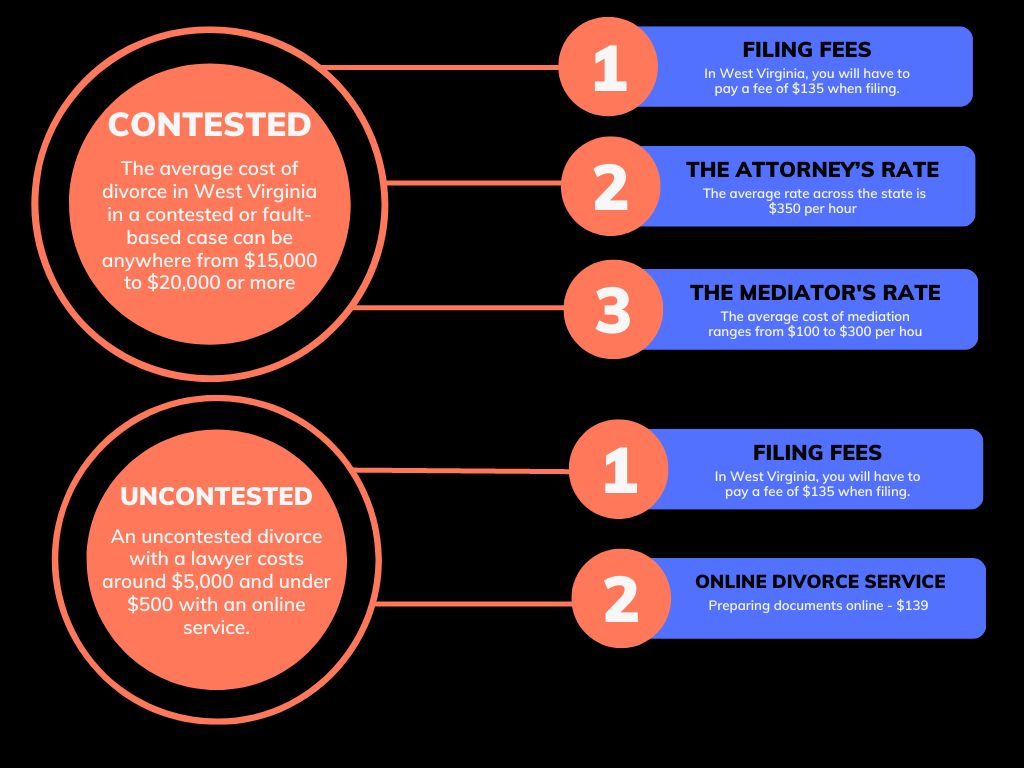
The cost of divorce will also be based on these factors:
- The attorney’s rate. The average rate across the state is $350 per hour, and it can be higher if a lawyer is experienced or it is a big city or county.
- Your level of agreement. The more things you and your spouse agree on before the court process starts, and the more you are willing to cooperate in general, the shorter the process will be. This also means that it will be cheaper.
- Whether a mediator is involved. If you and your spouse would like to try to come to an agreement concerning some matter, you may hire a mediator to help you. The average cost of mediation ranges from $100 to $300 per hour.
- Whether any other experts are involved in the case. For example, if you have a child custody battle, you may need to run a custody evaluation, which costs up to $15,000.
If you manage to reach an agreement and file for a no-fault uncontested divorce, you will have the least amount of expenses possible. The best part about such divorces is that you can get one without a lawyer. If you take all the necessary steps on your own and will be eligible for a fee waiver, you may even get your divorce for free.
A do-it-yourself divorce may become extremely stressful and extended due to the large amount of information that a person filing on their own should research and the mistakes they may make. That’s why many couples in West Virginia choose to work with an online divorce service that prepares all the paperwork at a flat affordable fee and provides filing instructions free of charge.
How Long Does a Divorce Take in West Virginia?
Even though there is no mandatory waiting period in West Virginia, the average time to finalize a divorce is:
- A no-fault divorce (irreconcilable differences) from 30 to 90 days.
- An uncontested no-fault divorce – around 30 days.
- A no-fault on the basis of voluntary separation – at least 1 year.
- A contested and/or fault-based divorce – 6 months – 1 year and more, depending on the seriousness of the case.
Generally, the more unresolved disputes there are between you and your spouse, the longer your divorce will take. Other factors that may delay the process are the court schedule, time it takes to gather evidence for fault-based cases, different types of evaluations, etc.
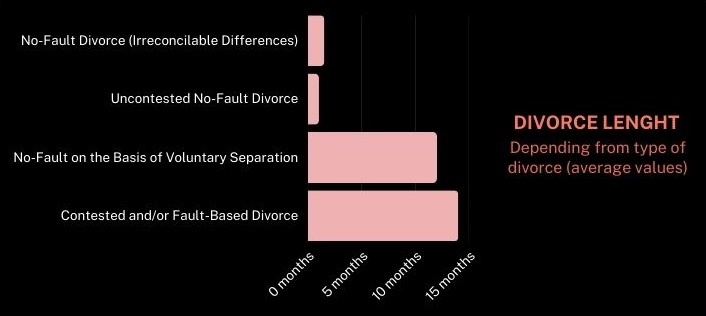
How to Split up Assets During a Divorce in West Virginia?
In West Virginia, all the assets of the spouses are divided according to the principle of equitable distribution. It means that each spouse will get a fair share of the assets depending on various factors, such as the contribution that each party had made, their earnings, etc. Also, WV is a state which recognizes the so-called non-monetary contribution, which includes doing household chores, raising children, etc.
The judge may also take an ‘economic misconduct’ of one of the spouses into consideration when splitting assets. For example, if it has been proven that the spouse has wasted family money or other assets as a result of their deviant behavior, for example, because of fraud or gambling, they may be granted a smaller share of marital assets.
Despite being an equitable distribution state, West Virginia is one of the few states in which the court may also decide to divide the assets acquired before the marriage. For example, if one of the spouses had some money and kept them in a joint family account, there are chances that this asset is no longer considered separate and is subject to a division. Of course, such a decision will be based on various individual factors.
Dividing assets also presupposes splitting the debts. In WV, the same equitable principle is applied. If the spouses acquired their debts during the marriage, they are likely to be ordered to pay them equitably. If they were acquired before the marriage, only the spouse, who is a debtor, would have to pay them.
How to Divide Property After Divorce?
Divorce laws on marital property in West Virginia are also based on the principle of equitability. The judge may take into consideration the following factors when making a decision:
- Spousal fault. Misconduct of the spouses may influence the decision on the property division in favor of the other spouse.
- The financial situation of each party. The judge may inspect the state each spouse is in economically, considering their professional prospects, earning capacity, age, health condition, etc. The party that is at a financial disadvantage may potentially, but not necessarily, get the bigger share of the property.
- Economic misconduct. The same as with assets, fraudulent or any other deviant financial behavior negatively affects the spouse who engaged in it.
- Child custody. A party that gets full custody over their children or more overnights is more likely to get a bigger share of property than another parent.
- Educational contribution. West Virginia has a quite specific law, according to which the spouse who contributed significantly to the education of their spouse may be awarded more property. It means that if one spouse has helped the other to get a good education, and as a result, the second spouse has a good source of income, their contribution may be recognized, and they may be awarded more property.
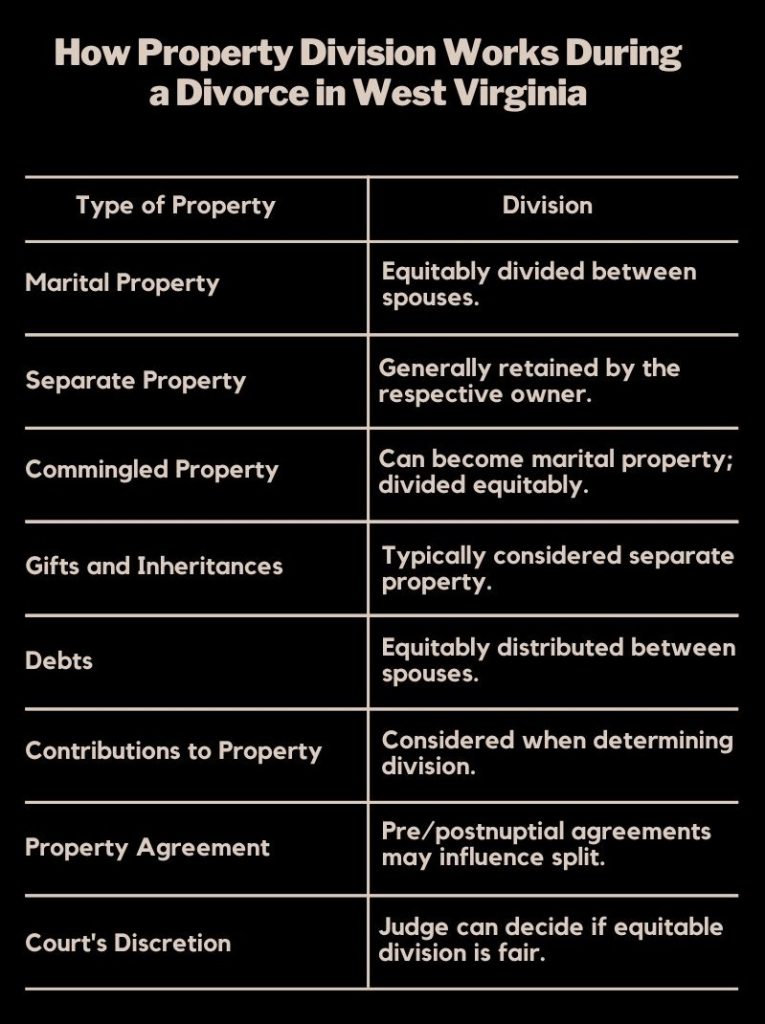
How to Manage Child Support and Alimony Under WV Divorce Laws
As in many other US states, parents in West Virginia must financially support their children. The amount of support is calculated based on various factors, such as the number of children in the family and each parent’s income. Parents can calculate the amount according to the state guidelines.
The parent who has received residential rights will be the one who receives support from the other parent. Even though both parents have to make financial contributions, the spouse who earns more will likely pay a higher percentage proportionate to their income. Sometimes, child support may be paid through income withholding. It means that the percentage from the payor’s salary will be withheld by their employer and sent to the Bureau of Child Support Enforcement.
Unlike child support, alimony payments are optional, and spouses may decide whether one of them wants to request them. Alimony or spousal support is a fixed amount paid by one spouse to the second one if they require financial support. There are four types of alimony in West Virginia: temporary, rehabilitative, permanent, and gross.
In order to evaluate and grant alimony, the court will have to consider several factors, such as marriage length, spouses’ income levels, age, health, and education, as well as standards of living during their marriage, among others. If the divorce filed is fault-based, then the alleged wrongdoing can also affect the decision on the alimony as well as its amount.
How Does Adultery Affect Divorce in West Virginia?
If your spouse has committed adultery and you are able to prove it, you can file for divorce based on this ground. ‘Does infidelity affect divorce?’ is a common question among divorcing couples. Indeed, the WV courts may consider adultery as a factor influencing such aspects as child custody and alimony.
For example, if your spouse’s infidelity affected their relationship with your child as well as your kid’s well-being, the court may grant a decision on custody in favor of the filing spouse.
Moreover, when making a decision on alimony, the court in WV takes into account the spouse’s infidelity. If there is substantial evidence, the judge may award alimony to the affected spouse. Or if the spouse who committed adultery has requested alimony, the court may deny it.
However, in order to file for a divorce claiming adultery, you need to prove that the cases of infidelity took place. You should also prove that you haven’t continued living with your spouse as a couple after exposing infidelity. If you manage to fulfill the conditions, then you can expect to obtain a divorce on your terms.
The Bottom Line
You can file for divorce in West Virginia based on no-fault or fault grounds. In the latter case, the court may make certain decisions in your favor, like spousal support, property, custody, or assets-related ones.
In situations where you have to prove your spouse is at fault for your marriage ending or when you cannot reach an agreement on financial and child-related decisions, you will have to hire lawyers. This may cost you around $15,000-$20,000 or more, depending on how long your divorce takes.
If you and your spouse do not wish to engage in litigations and are ready for a no-fault full-agreement divorce, you can get cheap paperwork help online from our service. This way, you will have the divorce forms and instructions necessary to file and will be able to divorce with record-low expenses.


Laura Fisher is a writer and a counselor, driven to her profession by her own personal experience. Almost twenty years ago, she found her life dramatically shifting due to a painful divorce. This trauma sparked a desire to assist others navigating similar challenges, leading her back to school to pursue a psychology degree. Over the past decade, Fisher has established a successful practice, and written plenty of articles helping divorcees heal and change their lives for the better.



